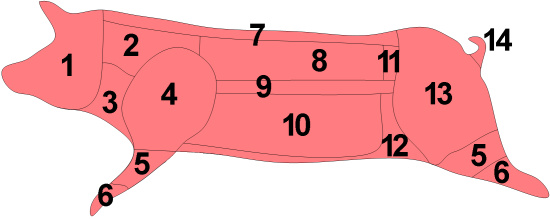Redwood Meat Company.
The region’s only federally certified slaughterhouse has stopped processing pigs due to pressure from federal regulators, leaving local pork producers and county fairs in the lurch.
In May, the United States Department of Agriculture told Myrtletown’s Redwood Meat Company that the equipment it used in the slaughter of hogs did not comply with federal regulations concerning the humane treatment of animals. Rather than upgrade its equipment, the company has decided to get out of the pig business.
“They didn’t like the machine that we were using that we’ve been using for 40 years,” Redwood Meat owner Cheryl Nylander told the Outpost yesterday. “It was our choice to not do the hogs. It wasn’t forced on us. It’s just that we couldn’t do it because we’d have to get some different facilities.”
This isn’t the first time Redwood Meat has been targeted for corrective action by the USDA’s Food Safety and Inspection Service. Back in March, the service briefly suspended the company’s USDA certification, due to an incident of “egregious act of inhumane handling of animals.”
On March 24, a USDA veterinary inspector at Redwood Meat observed a botched slaughter of a pen of five lambs. An employee was using a “knocking device” – the piece of gear made famous in No Country For Old Men – on the lambs. The agency’s letter of suspension to Redwood Meats, which was written the next day, described the scene in graphic detail:
The employee herded the lambs into a corner and delivered an effective first stunning blow on three lambs. The lambs were not restrained in any way and the movement of the animals appeared to interfere with the employee’s aim of the stunning blows on the fourth lamb. The employee then applied the stunner to the fourth lamb, with little effect except that the lamb began bleeding from the nose. The employee then turned towards the fifth unstunned animal and began to use the device until the [inspector] instructed him to stun the injured animal again. He delivered two more unsuccessful stuns in quick succession (10s), at which time the Kill Floor Manager arrived and the [inspector] requested that the .25 magnum hand-held penetrating captive bolt device be used to immediately stun this animal which was now recumbent, bleeding heavily and still conscious after the three unsuccessful stuns, as evidenced by heavy rhythmic breathing and normal eye blinks.
Two days later, after conversations with Redwood Meat management, the agency wrote the company a letter saying that its suspension of USDA certification would be held in abeyance while the company instituted improvements to its operations, including isolation pens for small animals being slaughtered. An increased inspection regime was put into place while these improvements were being put into place.
It is not known whether or not the more recent USDA action – the one that led the company to abandon the slaughter of pigs – is related to the earlier incident with the lambs. The USDA publishes its official correspondence with meat processors only periodically, so the letter that went to the company in May is not yet widely available. The Outpost has filed a Freedom of Information Act request to obtain the document.

The loss of pig processing at the only USDA-certified facility for many miles around has a small but noticeable effect on the local economy. Humboldt County Agricultural Commissioner Jeff Dolf told the Outpost yesterday that the most recent Census of Agriculture show that Humboldt County produced an estimated $24,000 worth of pork products in 2012.
That figure would not likely include the pork produced by Alexandre Family Farms in Crescent City – probably the region’s largest pork producer. According to farm owner Blake Alexandre, the 150 or so hogs it produces each year were previously delivered to Redwood Meat for processing, after which large slabs of meat would be delivered to the butcher departments of local grocery stores. Now, he said, his farm was scrambling to find alternatives, possibly in Oregon or the Central Valley.
Alexandre said that pork was still a sideline for his farm – one started by his daughter, a few years ago, while she was still in high school. “She’ll be out of college in about a year, and we were excited to grow that pork business,” he said. “This is kind of a twist.”
Redwood Meat’s other major supplier of hogs are the various farming clubs who show their animals at local county fairs. Richard Conway, the manager of the Humboldt County Fair – which begins next month – told the Outpost that his board has decided to pay around $1,000 to send those pigs to slaughter in either Sacramento or Escalon, Calif., at the fair’s own expense.
“The kids won’t see any direct impact on them,” he said. “The fair association will absorb the cost of shipping those hogs down to be processed.”
People who raise pork for their own consumption still have options – they can slaughter and butcher the animals themselves, or hire people to do either task. They just can’t offer that meat for sale.
Nylander said that hogs have never been a core part of Redwood Meat’s business. She estimated that in the past they have processed perhaps 30 pigs a month – 90 or so in fair season. She said that people in the community have offered to step up and help the company get their hog facilities into line with what the USDA’s office is requesting of them, but that the company has decided that it is not worth the effort.
She said that the local office of the USDA’s Food Safety Inspection Service, which is based in Alameda, has been exceptionally hard on local meat processing plants since the recent scandal in Petaluma, in which cancerous cattle were found to have passed through a slaughterhouse to the market.
“That office down in Alameda is just coming in and doing harder inspections,” she said. “We’re on about 60-90 days where they’re checking really hard. And not us – everyone.”
DOCUMENTS

CLICK TO MANAGE